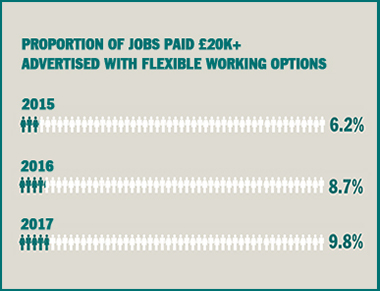

 The launch of the Flexible Jobs Index back in 2015 was an important step for us as champions of flexible working. Anecdotally, it was clear that the number of people who wanted to work flexibly far outstripped the number of quality jobs available; but until this point, there just wasn’t the data to prove it.
The launch of the Flexible Jobs Index back in 2015 was an important step for us as champions of flexible working. Anecdotally, it was clear that the number of people who wanted to work flexibly far outstripped the number of quality jobs available; but until this point, there just wasn’t the data to prove it.
Our solution was to carry out our own research and create a report that highlighted how many flexible jobs are being advertised, in what sectors and at what level. We committed to doing so annually for 10 years, in order to track the progress of the flexible job market, and allow employers to benchmark their own practice. That first year, we discovered that only 6.2% of jobs paying more than £20K FTE were advertised flexibly. And once again, in 2017, the Timewise Flexible Jobs Index has a story to tell.
The latest figures suggest that the market is continuing to move in the right direction; but frustratingly, the pace of change has slowed. The number of flexibly advertised jobs paying more than £20K FTE is now 9.8%, compared to 8.7% the previous year. What’s more, the data clearly shows that flexibility declines as salary rises, creating a huge challenge for flexible workers who are looking to progress their careers.
Are we asking too much? Isn’t some growth better than no growth? The problem is, if the market continues to grow at this modest rate, it could take as long as 40 years for the number of jobs that are advertised as offering flexibility to match the number of people in that market (54% of the UK workforce[1]). And that’s ignoring the fact that there are another 8.7 million people who don’t currently work flexibly, but would like to if the jobs were there[2].
We’ve had some real successes in the past few years in getting flexible hiring on the agenda. Our Hire Me My Way campaign has created a platform for employers to demonstrate their willingness to advertise and recruit flexible roles; so far, 40 organisations have signed up. And we’re currently working with national retailers, including Tesco, Dixons Carphone and the John Lewis Partnership, to help them design and deliver flexible jobs at management level.
But given the levels of uncertainty about the potential impact of Brexit on the workplace, and the new requirements to publish gender pay gap figures, one thing is for sure: all employers need to get smarter about using flexibility to attract, motivate and keep the best talent. Here are our suggestions for some good places to start:
If we all play our part, commit to making changes and see them through, we can look forward to the day when the growth in the flexible jobs market is really something to shout about. For all of us at Timewise, that day can’t come soon enough.
Published June 2017
To find out more about our training and consultancy services, contact info@timewise.co.uk or call on 020 7633 4444.
[1] Employee Outlook, Focus Commuting and Flexible Working, CIPD, 2016
[2]A Flexible Future for Britain, Timewise, 2014